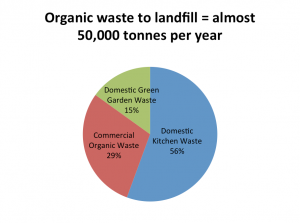 The ACT Government is about to spend $33.3 million on providing a third ‘green’ waste bin for all households in Canberra. This follows a ‘trial’ in Weston Creek and Kambah in 2016-17 at a cost of $1.3 million to over 7,000 households. It seems providing a ‘green’ bin is very popular with residents. But how many Canberrans know the difference between ‘green’ as in garden waste, such as tree and shrub pruning’s, soft weeds and leaf litter, and kitchen food waste? Do Canberrans think this new green bin will also manage our kitchen food waste?
The ACT Government is about to spend $33.3 million on providing a third ‘green’ waste bin for all households in Canberra. This follows a ‘trial’ in Weston Creek and Kambah in 2016-17 at a cost of $1.3 million to over 7,000 households. It seems providing a ‘green’ bin is very popular with residents. But how many Canberrans know the difference between ‘green’ as in garden waste, such as tree and shrub pruning’s, soft weeds and leaf litter, and kitchen food waste? Do Canberrans think this new green bin will also manage our kitchen food waste?
To put this into perspective for over a decade Canberra has had a very high ‘resource recovery’ of ‘green garden’ waste at over 90%. This has been achieved via a free or gold coin fee at garden organics drop-off centres and small business offering fee for service Trash Packs at place of residence. This garden organic material is then converted into compost which is then on-sold.
If we already achieve a 90% resource recovery rate for garden organics – why spend $30 plus million on doing it differently via a green bin. Be great to get the figure up closer to 100% but … are there better policy options to achieve this more cost effectively? Wouldn’t it be better to spend the money on managing our domestic kitchen food waste and organic commercial waste which is 16% of our waste to landfill compared with ‘domestic green waste’ at about 2% of our waste to landfill.
The decision to roll-out the ‘trial’ to all of Canberra was made before the ‘trial’ had even started let alone been evaluated. Some key questions that should be answered by the trial are:
- how much garden organics in tonnes was collected?
- when will the evaluation be available? Will the roll-out stop until the evaluation is complete?
- how much cross-contamination was there and how much of this was kitchen waste?
- will the 2017-18 trials include ways to collect food waste, to see if it possible to combine both?
- should we ‘trial’ a domestic food waste only bin?
- what are the policy options to reduce organic waste from the commercial sector?
Did you know?
- Almost 50,000 tonnes of organic waste goes to ACT landfill each year. This is a wasted resource as with appropriate systems this could be converted to useful materials – like compost.
- 45% of household waste to landfill is organic waste (FOGO) with 35% being kitchen food waste (Food Organics FO) and the other 10% green waste (Garden Organics – GO) that is almost half of your waste to landfill
- 15% of commercial waste is organic waste
- For the last decade over 90% of garden organics is recovered – and this was before the proposed garden waste bin!
- In Australian households, 33% of food waste is from fresh food every year, 27% is from leftovers, 15% is packaged and long life products and 7% is from takeaway food.
- The amount of food waste thrown on average amounts to around $1036 per household per year.
- The ACT is the third most wasteful state within Australia, generating up to 14.52kg of food waste per household per week.
- A 2014 garbage audit of ACT estimated that 35% of our household waste to landfill is food waste.
- Reducing household food waste is good for households, saves money, reduces waste management costs for the ACT Government and is better for the environment.
What is needed:
- better public reporting on our progress in reducing organic waste to landfill
- a publicly available review of the Weston and Kambah green waste bin trial as soon as possible
- consider improvements to the existing green garden waste system as an alternative to the green waste bin for all households – e.g. concessions for seniors, people with disabilities and others who cannot manage delivery of their own garden organics to the collection points or afford to utilise existing Trash Pack services
- provide for collection of food organics as well as garden organics in the in third green bin (sign our petition)
- measures to improve uptake of use of ‘compost’ made via the garden organics recycling system.
- community education: more $$ for community education to highlight food organics and garden organics (FOGO) measures
- Waste-to-energy: ACT Government to say no to use of waste-to-energy for garden organics or food organics as it is not a “last resort” measure and there are other ways to manage this material
- Reduce: food waste through community education.
Print version: Managing our green garden and kitchen organic waste
